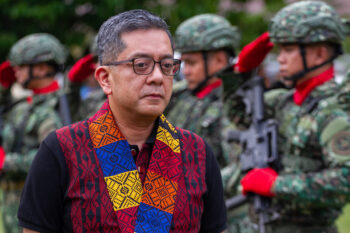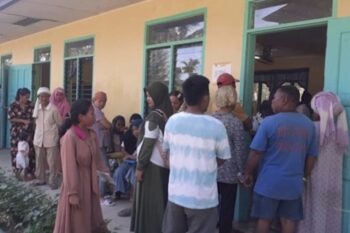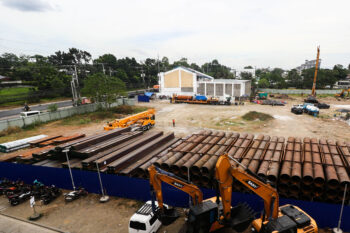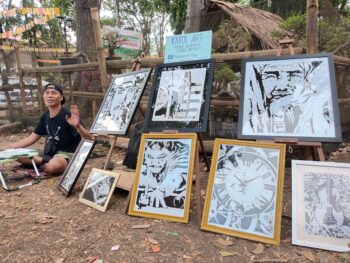DAVAO CITY (MindaNews/26 May) – The options for the beleaguered banana industry in the wake of the Scarborough Shoal standoff with China are “very, very limited” because markets in Asai and the Middle East are “already almost saturated,” Vicente Lao, chair of the Mindanao Business Council (MBC) told a gathering of business leaders here Friday.
“The Regional Development Councils were primed to look for options when we were in Manila. It’s very sad to note that government was asking us to look for other markets because you have to remember, the banana industry is a major contributor to the economy of Region 11 and we always put a very high level of importance to anything that affects the industry. However as we go over the markets we have in Asia and the Middle East, we have already almost saturated the market so there is really very, very little room for expansion,” Lao said, adding one possible solution is to “try to educate our domestic market to buy Cavendish banana instead of lakatan and latundan.”
Lakatan and latundan are native varieties of banana grown commercially for the domestic market.
But Lao’s proposal for the domestic market to choose Cavendish over lakatan and latundan also posed a problem. Ferdinand Maranon, chief executive officer and president of Sagrex Corporation told the forum that selling the export variety would displace the lakatan and latundan farmers. He also said they had earlier proposed to the Department of Trade and Industry to convince the Aquino administration that “instead of buying bread and sausages from China in feeding the poor in Manila,” government should buy bananas instead. He said the proposal was not acted upon.
Lao reiterated that the options are “really very, very limited when it comes to bananas.” He said the other market that they can look into is the United States “which is also too far and I don’t think we can compete with Latin America when it comes to that market.”
“We don’t know what other options are on the table. I think the industry is also cracking its head but government is still trying to talk to the Chinese government to try to be reasonable. I think the solution to this problem is political instead of technical and financial,” said Lao.
“This is a classic example when politics makes decision and business becomes collateral damage,” Lao said,. He noted that while this was not officially announced, “everybody knows” (that) the situation we are in now is “basically an offshoot of a political decision on the standoff with China in the Scarborough Shoal” (Panatag Shoal).
“From our point of view in the MBC, we feel that this was a crisis that was mishandled by crisis managers in Manila because this should have been approached as a simple poaching problem instead of a sovereignty issue. Had this been approached as a simple poaching problem we could have maybe gotten the assistance from all over the world, the Greenpeace, the Haribon society because when you approach an issue of poaching, you don’t need to talk about boundaries. When you are stealing or trafficking internationally banned species, you do not need to talk about boundaries because it has no boundaries. Well, (government) decided to approach this from a different angle so now we’re having this problem and as I said, the business sector becomes the collateral damage.”
A day after Lao said in Davao City that the export market for banana is “already almost saturated,” Agriculture Secretary Proceso Alcala told reporters in Zamboanga City on Saturday that government is “looking for more markets where to export” bananas and at the same time initiating stringent measures to ensure compliance to international standard protocols.
In early March, agriculture officials in China, the second largest market for Philippine bananas after Japan, withheld a total of 150 40-foot container vans of bananas on two separate occasions, claiming the bananas were allegedly infested with Aonidiella compere or scale insect.
The government dispatched the team from the DA’s Bureau of Plant Industry (BPI) led by Director Clarito Barron to present the Philippines’ plant quarantine protocols, as well as coordinate and validate with their Chinese counterparts in Beijing that Philippine bananas are of export quality and free from insects
“We are continuously looking for more markets. Actually, there are ongoing negotiations with other countries where we could sell our product,” Alcala said. “The more export market, the better.” He said there are negotiations with Singapore and other countries in the Middle East and expanding the Japan market.
On May 17, Alcala and Kuwaiti Ambassador Waleed Amad Al-Kandari discussed increasing trade of agricultural products, particularly bananas and basmati rice.
Al-Kandari, who visited the DA central office in Quezon City, assured Kuwait will continue to buy fresh Philippine bananas, and “in fact a Kuwaiti company which invested in a Davao banana farm plans to expand its hectarage to satisfy increasing demand.”
Alcala said he received a report a team of experts dispatched to China that Chinese agriculture officials have already allowed the entry of 190 container vans of Philippine bananas.
Stephen Antig, President of the Philippine Banana Growers and Exporters Association (PBGEA) told MindaNews “maybe Alcala has direct information when he said that 190 containers have been released because his staff was in China. We still have to find out if the information is true and whose bananas are those.
“Right now it is very difficult to determine how many container (container vans of bananas) are considered goners because some are still being inspected or scheduled.”
He said that before the crisis, they shipped 1.2 million boxes per week valued at four dollars per box. “Assuming six weeks of shipment lost, that is definitely substantial though it may not reach one billion pesos yet. The price is conservative estimate because it is higher than that.”
The banana industry earns about $720 million a year and directly employs some 240,000 workers. It contributes about 24 percent to the country’s total agricultural exports, the DA said. (Carolyn O. Arguillas/MindaNews with reports)







